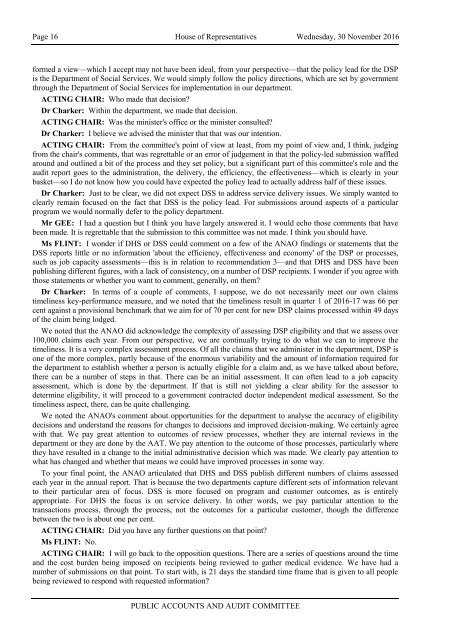Proof Committee Hansard
2hbqb7M
2hbqb7M
Create successful ePaper yourself
Turn your PDF publications into a flip-book with our unique Google optimized e-Paper software.
Page 16 House of Representatives Wednesday, 30 November 2016<br />
formed a view—which I accept may not have been ideal, from your perspective—that the policy lead for the DSP<br />
is the Department of Social Services. We would simply follow the policy directions, which are set by government<br />
through the Department of Social Services for implementation in our department.<br />
ACTING CHAIR: Who made that decision?<br />
Dr Charker: Within the department, we made that decision.<br />
ACTING CHAIR: Was the minister's office or the minister consulted?<br />
Dr Charker: I believe we advised the minister that that was our intention.<br />
ACTING CHAIR: From the committee's point of view at least, from my point of view and, I think, judging<br />
from the chair's comments, that was regrettable or an error of judgement in that the policy-led submission waffled<br />
around and outlined a bit of the process and they set policy, but a significant part of this committee's role and the<br />
audit report goes to the administration, the delivery, the efficiency, the effectiveness—which is clearly in your<br />
basket—so I do not know how you could have expected the policy lead to actually address half of these issues.<br />
Dr Charker: Just to be clear, we did not expect DSS to address service delivery issues. We simply wanted to<br />
clearly remain focused on the fact that DSS is the policy lead. For submissions around aspects of a particular<br />
program we would normally defer to the policy department.<br />
Mr GEE: I had a question but I think you have largely answered it. I would echo those comments that have<br />
been made. It is regrettable that the submission to this committee was not made. I think you should have.<br />
Ms FLINT: I wonder if DHS or DSS could comment on a few of the ANAO findings or statements that the<br />
DSS reports little or no information 'about the efficiency, effectiveness and economy' of the DSP or processes,<br />
such as job capacity assessments—this is in relation to recommendation 3—and that DHS and DSS have been<br />
publishing different figures, with a lack of consistency, on a number of DSP recipients. I wonder if you agree with<br />
those statements or whether you want to comment, generally, on them?<br />
Dr Charker: In terms of a couple of comments, I suppose, we do not necessarily meet our own claims<br />
timeliness key-performance measure, and we noted that the timeliness result in quarter 1 of 2016-17 was 66 per<br />
cent against a provisional benchmark that we aim for of 70 per cent for new DSP claims processed within 49 days<br />
of the claim being lodged.<br />
We noted that the ANAO did acknowledge the complexity of assessing DSP eligibility and that we assess over<br />
100,000 claims each year. From our perspective, we are continually trying to do what we can to improve the<br />
timeliness. It is a very complex assessment process. Of all the claims that we administer in the department, DSP is<br />
one of the more complex, partly because of the enormous variability and the amount of information required for<br />
the department to establish whether a person is actually eligible for a claim and, as we have talked about before,<br />
there can be a number of steps in that. There can be an initial assessment. It can often lead to a job capacity<br />
assessment, which is done by the department. If that is still not yielding a clear ability for the assessor to<br />
determine eligibility, it will proceed to a government contracted doctor independent medical assessment. So the<br />
timeliness aspect, there, can be quite challenging.<br />
We noted the ANAO's comment about opportunities for the department to analyse the accuracy of eligibility<br />
decisions and understand the reasons for changes to decisions and improved decision-making. We certainly agree<br />
with that. We pay great attention to outcomes of review processes, whether they are internal reviews in the<br />
department or they are done by the AAT. We pay attention to the outcome of those processes, particularly where<br />
they have resulted in a change to the initial administrative decision which was made. We clearly pay attention to<br />
what has changed and whether that means we could have improved processes in some way.<br />
To your final point, the ANAO articulated that DHS and DSS publish different numbers of claims assessed<br />
each year in the annual report. That is because the two departments capture different sets of information relevant<br />
to their particular area of focus. DSS is more focused on program and customer outcomes, as is entirely<br />
appropriate. For DHS the focus is on service delivery. In other words, we pay particular attention to the<br />
transactions process, through the process, not the outcomes for a particular customer, though the difference<br />
between the two is about one per cent.<br />
ACTING CHAIR: Did you have any further questions on that point?<br />
Ms FLINT: No.<br />
ACTING CHAIR: I will go back to the opposition questions. There are a series of questions around the time<br />
and the cost burden being imposed on recipients being reviewed to gather medical evidence. We have had a<br />
number of submissions on that point. To start with, is 21 days the standard time frame that is given to all people<br />
being reviewed to respond with requested information?<br />
PUBLIC ACCOUNTS AND AUDIT COMMITTEE















